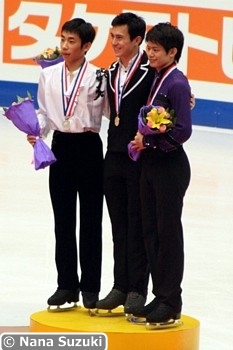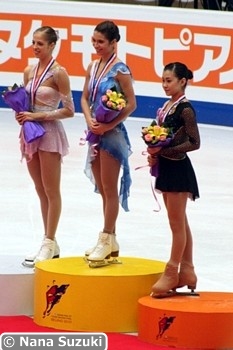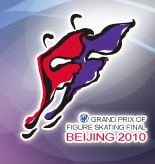
The ISU Grand Prix Final 2010 - Finals Day
November 15, 2010
By Yukiko Sawaguchi
Photos © Nana Suzuki
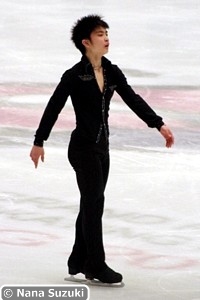 The
competition concluded with some surprises and some great skating.
The
competition concluded with some surprises and some great skating.
Junior MenÂ’s Singles / Free Skating highlights
Han Yan – Zigeunerweisen
The Capital Indoor Stadium was shaking from the roaring of the
crowd as they rooted for Yan! His long program was a bit bittersweet;
it included a solo Triple flip which was intended to be in combination
with a triple toe, a triple Lutz-single toe combination, and a beautiful
triple Salchow from a Spread Eagle. Although it was not what he
planned and he stepped out on some jumps, he earned 186.05 points
overall and grabbed the silver at the first Junior Grand Prix Final
in his home country.
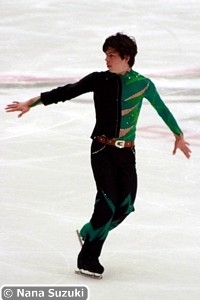 Keegan
Messing – The Incredibles
Keegan
Messing – The Incredibles
Considering his excellent performance in the short program, his
long was disappointing. He singled the Axel in the intended triple
Axel-double toe combination, was shaky on the triple Lutz-double
toe combination, took a fall before the triple loop and at the end
of the straight-line step sequence. He fell to 8th place
in the long program and dropped from 2nd to 5th overall with 175.42
points.
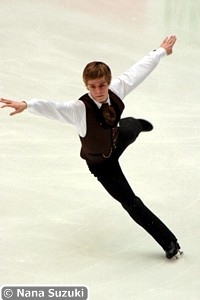 Richard
Dornbush – Sherlock Holmes
Richard
Dornbush – Sherlock Holmes
He landed eight triples including the triple Axel-triple toe combination, a triple Lutz, a solid triple Axel, and a clean triple Lutz-double toe-double loop combination. His superb performance had never been better this season.
Brilliance on the ice is indispensable to a top skater at the senior level. However, I didnÂ’t feel that for his short program. Of course he performed a clean program and executed all his planned jumps, but honestly speaking, that was not enough for me to enjoy his skating. Today I felt like I saw his sparkling joy and enthusiasm for skating again, which warmed my heart and I appreciate his performance from the heart. I was glad to be there and congratulate him on winning this event, it was definitely his day!
Richard earned 148.8 points for the free skate and with 219.56
points total he won the gold of the Junior MenÂ’s Grand Prix Final
with a margin of 33.51, a pretty big win.

Comments
Richard Dornbush
“I was very happy with today’s performance. I could do all the planned elements; of course I am supposed to do [that] though. Even if you complete clean programs 75% of the time in practice, being able to do it in competition is something completely different. I was a little bit nervous beforehand, but as soon as I got here to warm up I felt nothing but confidence. It was definitely the best I've ever skated that program, even including practice!”
I was really touched by his comment about how he overcame the injury last season:
“To get over difficulties is a part of the sport, and so are injuries. I guess to never give up hope is the key to overcoming. When I was injured, I always thought only of how I could get better.”
ThatÂ’s easy to say but difficult to do. Richard actually DID it,
which led him to what he is today.
Han Yan
“I couldn’t skate well and I’m not satisfied with my skating without
triple-triple combinations and mistakes on other jumps. Maybe it
is because this competition was held in Beijing, so I was more nervous
than in other places. In the near future, I am going to include
a triple Axel and even a quadruple toe if the consistency increases.”
Junior Pairs/ Free Skating
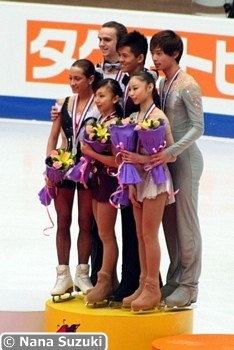 Narumi
Takahashi and Mervin Tran of Japan won the junior
pairs event for the first time with 159.52 points. Although it was
not a perfect performance—Narumi fell on the triple Salchow and
stepped out of the landing of the throw triple loop—the team showed
off their ability to compete in the senior circuit as they stretched
into difficult positions in lifts and spirals.
Narumi
Takahashi and Mervin Tran of Japan won the junior
pairs event for the first time with 159.52 points. Although it was
not a perfect performance—Narumi fell on the triple Salchow and
stepped out of the landing of the throw triple loop—the team showed
off their ability to compete in the senior circuit as they stretched
into difficult positions in lifts and spirals.
Comments by Takahashi/Tran
"I was really happy to listen to the Japanese anthem today
because I have never heard the Japanese anthem in competition for
us. I have learned a lot from the Japanese pairs skater, Yuko Kawaguchi
(competing for Russia), competing in the senior event. Today we
have learned that even though we made one mistake (fell on a jump),
we are able to complete our other elements as we usually do. One
big mistake doesnÂ’t always create a landslide fiasco if we really
focus on the performance.” Narumi said with a ‘did-I-make-myself-understood-
"My feet really hurt. I am feeling tired, but it is awesome to finish like this. My next goal is to try to do harder elements," Tran said.
They also mentioned that they will compete at both the Junior and
Senior Worlds even though Nationals is right before. Pair events
are not common in Japan because Japanese male skaters are not tall
enough to be pair skaters, and it is very difficult to find a partner.
Besides, practice time assigned to the couples is very short. Good
opportunities for couples are not yet well developed in Japan. Not
many pairs will compete at Nationals and Takahashi/Tran are expected
to become Japanese pair champions without any problems qualifying
for Worlds. Narumi also showcased her fluent Chinese to communicate
with the Chinese media without a translator.
Senior Men/ Free skating
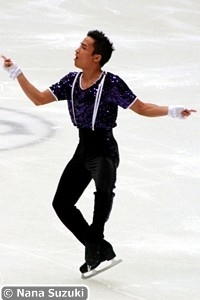 Florent
Amodio –Michael Jackson
medley
Florent
Amodio –Michael Jackson
medley
Although he doubled his triple loop, he was able to organize the other planned elements of his program including a clean triple Axel and triple Axel-double toe, triple Salchow-triple toe and triple Lutz-double toe combinations. He collected 140.26 points and finished 5th in the free program 6th overall with 201.90 points.
In the official practice, he showed off his condition by landing
solid triple jumps in sequence. It is indeed different to skate
in competition compared to practice, like the junior gold medalist
said.
Tomas Verner – Michael Jackson Medley
Compared to last season, his performances have been by far better
this year. He still seems to struggle to include both the quad toe
and a triple Axel. With his skillful edgework, jumping ability,
presentation and well-balanced program, he deserves to be called
the favorite to win any title, but one thing he has been pursuing
for years is jump consistency.
 There
are always ups and downs in his performance and this time was no
different. The quad toe attempt turned out to be a triple toe and
he made the triple Lutz-double toe combination a sequence by doing
three-turns twice in between, and the triple flip-double toe-double
loop combination ended up just a triple flip. He did land most of
the triples as planned including a triple Axel-double toe combination,
a triple Axel and a triple Lutz. With 148.27 points in the free
skating, he earned 213.64 overall and finished in 5th place.
There
are always ups and downs in his performance and this time was no
different. The quad toe attempt turned out to be a triple toe and
he made the triple Lutz-double toe combination a sequence by doing
three-turns twice in between, and the triple flip-double toe-double
loop combination ended up just a triple flip. He did land most of
the triples as planned including a triple Axel-double toe combination,
a triple Axel and a triple Lutz. With 148.27 points in the free
skating, he earned 213.64 overall and finished in 5th place.
When I looked at his planned elements sheet, I wondered why he
was trying to do a triple flip in combination with two other jumps
because his triple flip is usually judged as cheated by the technical
panel, which means the triple flip is not his best jump. In my opinion,
there is room for a review of his strategy.
Takahiko Kozuka – Piano Concerto No. 1 by Liszt
Takahiko also to open his long program with a quad toe, but under-rotated
it. He landed most of his triple jumps solidly including a triple
Axel, a triple Lutz-triple toe combination, and from a deep-edged
Spread Eagle into a triple loop. Only the triple Axel-double toe
combination had a shaky landing. With all level 4 spins and a level
3 step sequence, he earned 159.89 points in his long program and
won the bronze medal.
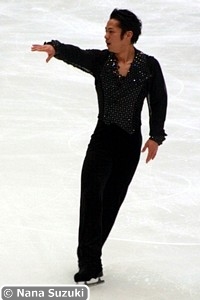 Daisuke
Takahashi — Inverno Porteno by Piazzolla
Daisuke
Takahashi — Inverno Porteno by Piazzolla
Obviously Takahashi looked like he had a physical problem. He two-footed
a downgraded quad flip, stepped out of some jumps and fell on his
second triple Axel and triple Lutz. His presentation marks remained
high at 81 points, earning the same number of points as the skater
in third place. But with 219.77, he dropped off the podium finishing
without a medal.
As matter of fact, in the official practice on the 2nd day, Kozuka and Takahashi bumped into each other when Takahashi was doing his run-through. Kozuka was repeatedly checking his entry to the triple loop when he crossed into Takahashi’s program space. Both skated backward, so neither skater saw the other. Naturally, a collision is high-impact and both Japanese skaters went flying. Some of the people witnessing their collision were shocked and screamed. Kozuka turned pale and apologized to Takahashi immediately—it was his fault. In practice, skaters are supposed to give the right of way to the skater who is doing his run-through. He knew that. Of course Takahashi said it was OK, he was all right, but he didn’t seem to be all right. It was believed Takahashi suffered symptoms similar to whiplash and considered withdrawing, but held back for his close teammate.
Japanese skaters have only two weeks to go before Nationals are
held in Nagano. All three skaters are expected to compete there.
Japan has three spots for menÂ’s singles; medalists will qualify
for Worlds held in Tokyo in March.
Patrick Chan – Phantom of the Opera
Jump elements: quad toe, triple Axel-triple toe, triple Lutz, triple Axel, triple Lutz-single loop-triple Salchow, triple flip, triple loop-double toe
Canada's Patrick Chan carried out his best performance through his beautiful routine, including a quad toe, a triple Axel-double toe combination, an Ina Bauer into a triple Lutz and won his first Grand Prix Final title. Although the first quad was supposed to be in a combination with a triple toe; he quickly recovered and added a triple toe after the triple flip, making it a combination. With skillful footwork and gorgeous choreography, he earned a record-high PCS of 87.22. Overall, he earned 259.75 points.
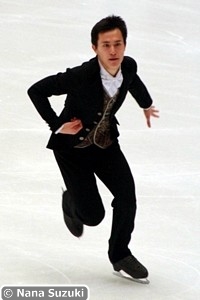
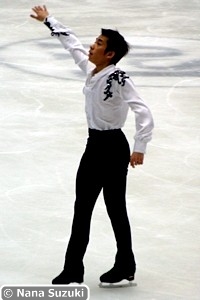
Nobunari Oda – Piano Concerto No. 1 by Grieg
According to what he often says, he doesnÂ’t like starting last
in the free skate because it makes him tense. In two competitions
in the Grand Prix series, he won the short and was overthrown in
the long. Despite the fall on the quad toe, which was downgraded,
he executed a triple Axel-triple toe combination, a triple flip,
triple Lutz, triple Axel, and a triple Salchow-double toe-double
loop combination, but fell after the last jump, a double Axel and
tumbled on the ice. He won the silver medal, the top placement among
the three Japanese skaters.
Comments
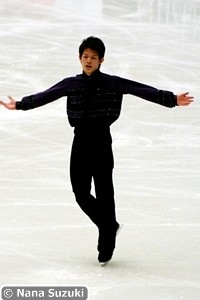 Kozuka
said in Japanese at the press conference after the collision incident:
“I feel so sorry for Takahashi and will try not to let this happen
again.” It was not translated into English, but people surrounding
him, including gold medalist Chan, may have assumed what Kozuka
kept saying and comforted saying, “Don’t worry too much, it happens
sometimes in practice. I, myself, hit Adam in competition the other
day—we got bruised.”
Kozuka
said in Japanese at the press conference after the collision incident:
“I feel so sorry for Takahashi and will try not to let this happen
again.” It was not translated into English, but people surrounding
him, including gold medalist Chan, may have assumed what Kozuka
kept saying and comforted saying, “Don’t worry too much, it happens
sometimes in practice. I, myself, hit Adam in competition the other
day—we got bruised.”
"I am very happy to win here today because my last two Grand
Prix Finals were not that good," Chan said. "It has been
a phenomenal experience to skate here in China because my parents
are Chinese."
“I was disappointed in myself with the mistakes on the quad and the double Axel, but with this performance I could achieve a good result as the silver medalist. I think it’s nice.” Oda commented.
In a private interview with the Japanese media, he said, “I feel
terrible that I did the same thing in the Grand Prix circuit. I
was at the top in the short and turned back in the long and ended
up 2nd in both events. I will practice much harder and not let it
happen again.” He continued that he will not change his long program
as he likes it. In the beginning of this season, he intended to
ask former choreographer, David Wilson, who knows his characteristics,
to choreograph his program. His coach, however, recommended Sebastian
Britten, who picked the music for the free skate. Although both
programs have increased difficulty as they incorporate elaborate
turns and steps for the entries/exits of the jumps, he said it didnÂ’t
affect his consistency through the program (he felt a bit of the
physical challenge at Skate Canada though).
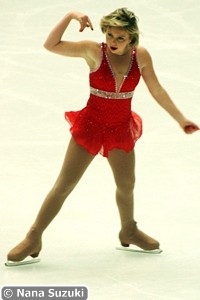 Ladies
Single/ Free Skating
Ladies
Single/ Free Skating
Rachael Flatt – Slaughter on Tenth Avenue
I am a bit worried about what happened to her. Unlike her usual
strong skating and completion of five types of stable jumps, including
a triple Lutz-triple flip combination, she fell on her triple Lutz,
an intended combination with a double toe, doubled three planned
triples and had three triples downgraded. With a total score of
127.57 points, she sunk to the bottom of the field.
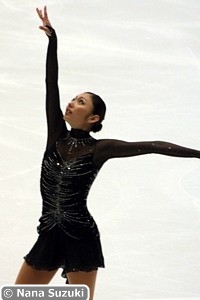 Miki
Ando – Piano Concerto in A Minor by E. Grieg
Miki
Ando – Piano Concerto in A Minor by E. Grieg
Miki was different today! With six triples, including three combinations,
she showed us strong skating and a nearly perfect performance. She
received the largest applause from a standing audience. Although
she ranked 1st in the free skate, due to a poorly performed new
short program, her final placement was 5th with a score of 173.15
points.
 Akiko
Suzuki – Fiddler on the roof
Akiko
Suzuki – Fiddler on the roof
We witnessed two wonderful performances in a row by Japanese skaters!
Akiko landed seven triples, one after another, including a double
Axel-triple toe combination, a triple loop-double Axel sequence
and a triple flip-double toe combination very cleanly. Using skillful
edges, she expressed the joy of figure skating dynamically from
head to toe. She finished 4th.
Kanako Murakami – The mask of Zorro
She opened with a flying-high triple toe-triple toe combination
and landed six clean triples with powerful skating, but she popped
the triple flip and turned it into a single. All of her spins and
steps were levels 3 or 4. With 178.59 points, she won the bronze
medal in her first trip to the senior Grand Prix Final.
 Carolina
Kostner – Aprés-midi d’un Faune by Debussy
Carolina
Kostner – Aprés-midi d’un Faune by Debussy
In the official practice, Kostner tried a triple flip, but she
didnÂ’t show us the jump in the competition and completed only four
triples. Her program consists of two triple Loops, a triple Salchow,
and a triple toe, plus two double Axels. Among them she singled
her second intended triple loop yet this program makes good use
of her fluent edgework, speedy skating and complicated steps to
impress people with fine arts on the ice. She remained in 2nd and
secured the silver.
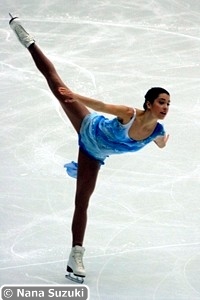 Alissa
Czisny – Winter and Spring
Alissa
Czisny – Winter and Spring
Although her program doesnÂ’t include a triple-triple combination,
she landed two combinations, a triple Lutz-double toe and a triple
flip-double toe, and 6 triples. For a long time the jumps have been
her “Achilles heel” preventing her from reaching the podium. Since
the first official practice, she had hardly fallen and showed that
she was in her best shape. Her signature movements; amazingly positioned
spirals, well-centered high-speed spins and elegant and fluent skating
attracted not only the judges but also the audience at the Capital
Indoor Stadium. Her program gave me the impression of a movie about
a lovely winter fairy. Good chemistry between Alissa and this program
may have been another contributing factor to her win. She was 3rd
in the long program, but she won her first Grand Prix Final title.
Her performance brought tears to my eyes. She had a really hard
time last year, falling to 10th at the US Nationals. Since I saw
her skating for the first time at the Grand Prix Final held in Tokyo
5 years ago, I have been looking forward to seeing her on the podium.
My dream came true, congratulations, Alissa!
Comments
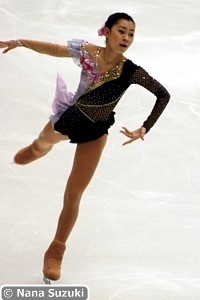 In
the press conference, Kanako
was asked what she thinks about being compared to Mao Asada. She
replied, “It doesn’t matter what Mao achieved at my age. Despite
a mistake I had a good result and it is an honor to stand on the
podium at the Grand Prix Final, especially because this is my first
year for competing in the senior circuit. However, I am disappointed
because I could have skated better.”
In
the press conference, Kanako
was asked what she thinks about being compared to Mao Asada. She
replied, “It doesn’t matter what Mao achieved at my age. Despite
a mistake I had a good result and it is an honor to stand on the
podium at the Grand Prix Final, especially because this is my first
year for competing in the senior circuit. However, I am disappointed
because I could have skated better.”
Carolina said, “I feel so comfortable out there, and had so much
fun. My jumps were okay with only one mistake. I was happy just
to have qualified to be here and happier to medal. After a few years
of disappointment, I think todayÂ’s skate gave me the confidence
that I made the right decision to keep skating because I love it.
I am very happy.”
Alissa: “I've made a lot of changes since last season; I almost
feel like this is a new beginning for me. The past is gone – over
and done with – and I'm a new skater. I stayed on my feet so
I'm happy. I really had to fight my way through that program,
but I'm very happy with the outcome. It's good to be back
and to be able to perform to my potential. My goal here was to skate
my best. I can't control the outcome; I dreamed of winning,
and it happened. I was really nervous going in, so just being able
to stay on my feet today was an accomplishment in itself. It's
pretty amazing to be called the Grand Prix Final champion. It's
something I've always wanted."
